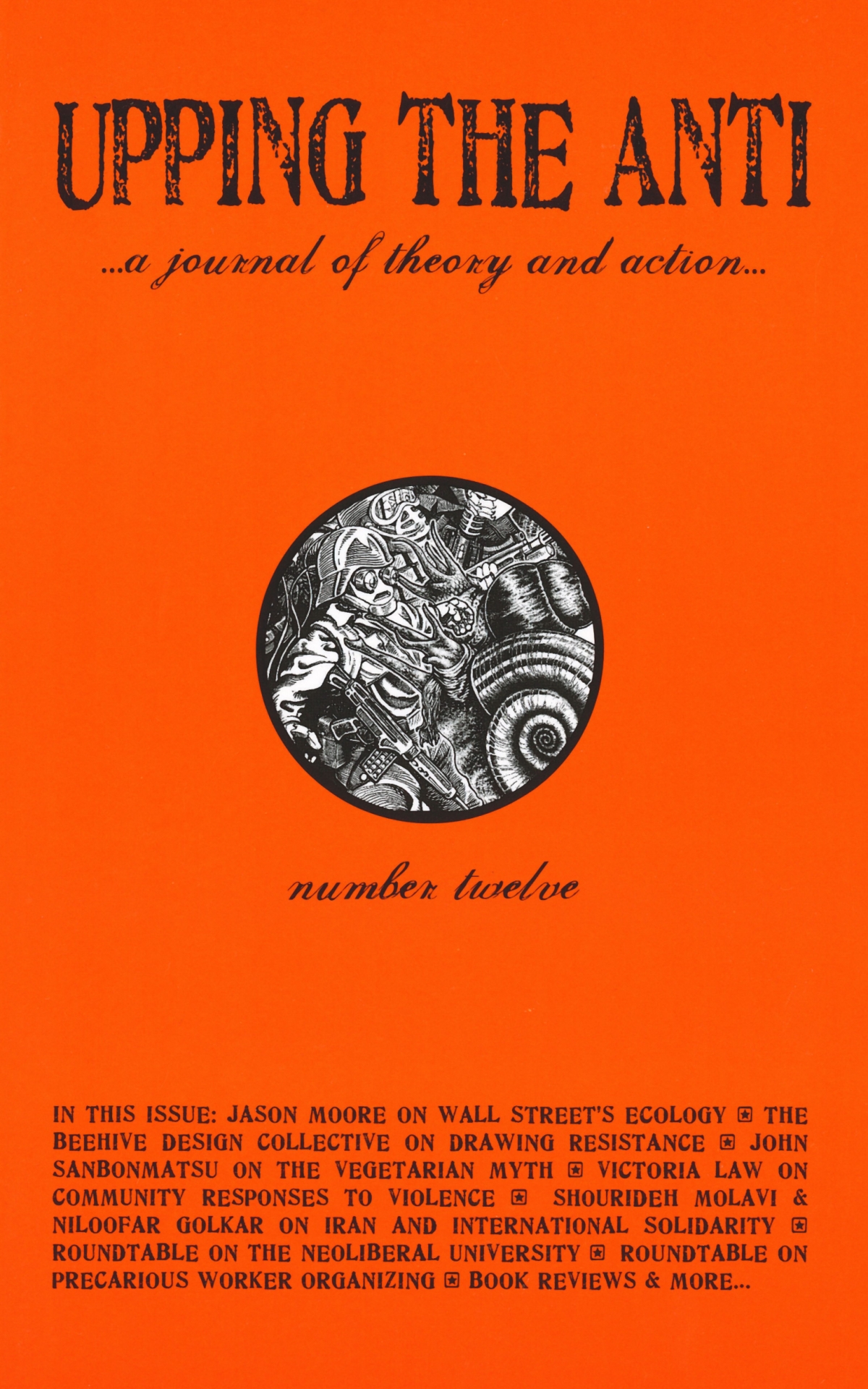Introduction
Six months ago, we released UTA 11 and proclaimed that it had been “born in interesting times.” It’s an assessment that continues to apply today as we release this, our twelfth issue. Since last summer’s G20 showdown on the streets of Toronto, radicals have had to consider how best to reconsolidate in the face of ongoing criminal charges and threats of infiltration. At the same time, opportunities seem everywhere to be on the horizon. Though they remain unresolved, the revolutions in the Middle-East and the anti-austerity protests in Europe remind us that mass movements have the power to change the world.
Meanwhile, right wing movements are also on the rise. In Wisconsin, a governor inspired by the Tea Party was able to ram through anti-labour legislation by blaming the economic crises on workers. And though students, unionists, activists, and community members retaliated by occupying the Capitol building for more than two weeks (and though solidarity extended so broadly that the occupiers received a pizza delivery arranged by Egyptian protestors in Tahrir Square), the battle of Wisconsin was not won. Instead of a general strike, the movement degrenerated into a recall campaign. It’s an outcome that forces us to ask: what would it take to win?
In our editorial this issue, we examine why the left in North America continues to be socially marginal despite the fact that radical critiques of capitalism have never been easier to make. In the midst of massive austerity, why is it so difficult for the left to gain traction? In order to address this question, we propose that we must develop our capacity to orient to the contradictions underlying people’s identification with right wing politics.
In this issue’s interviews section, Tom Keefer speaks with historian and political economist Jason Moore about ecology, the financial crisis, and the future of capitalism. Following that, we are pleased to present a conversation between Ander Reszczynski-Negrazis and Lara Bee on the radical art and pedagogy of the Beehive Design Collective.
In our articles section, John Sanbonmatsu takes issue with the left’s recent attacks on veganism and animal rights and argues – contra Lierre Keith – that a sustainable future depends on an end to the human consumption of other animals. Next, Victoria Law examines grassroots responses to violence in our homes and communities and offers suggestions for organizing outside the criminal justice system.
Finally, Niloofar Golkar and Shourideh Molavi evaluate the North American left’s responses to the “Green Revolution” in Iran and propose that international solidarity activists must overcome a series of inherited conceptual dichotomies in order to be succesful.
In our first roundtable, David Hugill and Élise Thorburn sit down with European education activists to discuss their experiences organizing against neoliberal incursions into the university sector. Next, Adrie Naylor convenes a panel to discuss the rise of precarious labour and the strategies that organizers in Toronto and beyond are using to challenge it.
We are pleased to feature four book reviews in this issue. Harry Thorne reviews John Holloway’s Crack Capitalism; Kirstin Schwartz tackles Islands of Resistance, a collection edited by Andrea Langlois, Ron Sakolsky, and Marian van der Zon; Anthony Fenton discusses Todd Gordon’s Imperialist Canada; and Sharmeen Khan assesses Sherene Razack, Malinda Smith, and Sunera Thobani’s States of Race.
On the administrative front, we would like to welcome Élise Thorburn to the Editorial Committee. Former Editor David Hugill has moved to our Advisory Board, where he is joined by new members Kailin Stacy, Robyn Maynard, and Robert Butz. Finally, we would like to thank outgoing Advisory Board members Dan Berger, Nicole Cohen, Chris Harris, and Shelly Tremain. We wish them well on their future endeavours.
From its inception, Upping the Anti has relied solely upon donations, subscriptions, and sustainer contributions. This has allowed us to remain fiercely independent; however, it also means that we’re often strapped for cash. For this reason, we ask that you consider becoming a UTA sustainer. Sustainers can sign up to pay $5- $100 a month through Paypal or pre-authorised debit payments to support our project. With 100 new sustainers, we will be able to hire a staff person to help us deal with all those administrative details that threaten to fall through the cracks, as make some headway in raising the $7000 it costs to print and distribute each issue of the journal.
The opportunity to hire an administrative staff person shows how much we’ve grown; still, Upping the Anti continues to be a volunteer effort. We hope you enjoy the fruits of our collective labour. As usual, putting together this issue was both arduous and joyful. We’re happy to have managed to publish a dozen issues under conditions that remain unfavourable to alternative and small-scale periodicals. If you like what you see, please consider becoming a sustainer. To find out more about our sustainers program, please visit us online at www.uppingtheanti.org.
Finally, if you’re interested in contributing to UTA 13 (scheduled for release in October 2011), please send us a pitch at uppingtheanti@gmail.com no later than June 3, 2011. For more information, pleasse visit us online at www.uppingtheanti.org.
Enjoy the issue! We look forward to your letters, submissions, and support.
In solidarity and struggle,
Aidan Conway, Kelly Fritsch, Tom Keefer,
Sharmeen Khan, Robyn Letson, Adrie Naylor,
Clare O’Connor, AK Thompson,
Élise Thorburn, Simon Wallace
Toronto, April 2011

